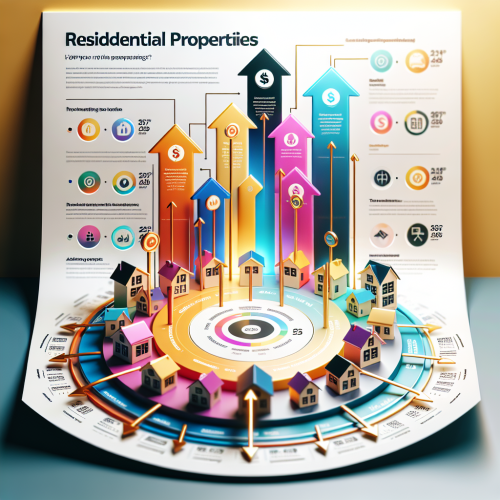Residential Properties – Investing in residential properties has always been a solid way to build wealth. And with 2025 just around the corner, the real estate market is going to have its own set of unique challenges and opportunities. If you’re thinking about jumping into residential property investment, there are some things you definitely want to consider to avoid mistakes and ensure you make smart choices. Trust me, I’ve learned the hard way with a few missteps, and I’m here to share what I’ve picked up along the way.

Tips for Investing in Residential Properties in 2025
1. Know the Market—Don’t Just Rely on Trends
I’ll be honest. When I first started investing, I had this obsession with following the “next big trend.” Everyone was talking about tech hubs, urban renewal projects, and flashy new developments. It made sense—after all, who doesn’t want to cash in on a hot neighborhood? But here’s the kicker: trends can be misleading.
It wasn’t until I did a deep dive into local market research that I realized how important it is to understand the specific dynamics of the area you’re investing in. It’s not enough to go with the flow of where people are moving. You need to think long-term. Look at property appreciation trends, average rental prices, and neighborhood development plans. Check the economic indicators like job growth, infrastructure projects, and even local government policies that could impact real estate. I remember passing up on a modest-looking property that turned into a huge win simply because I took the time to understand the neighborhood’s potential.
In 2025, the best advice I can give is to always be data-driven. Websites like Zillow and Realtor.com can give you some basic insights, but also take the time to visit the area, talk to locals, and connect with real estate agents who know the market inside and out. They can tell you where the true value is.
2. Understand Your Financing Options
I’ve been there—trying to get a loan with my fingers crossed, hoping everything works out. But let me tell you, one of the most critical parts of residential property investing is understanding your financing options upfront. In 2025, the real estate market is seeing changes with rising interest rates, stricter lending criteria, and new regulations for investors.
If you’re relying solely on traditional bank loans, you might run into hurdles. Consider diversifying your options: explore FHA loans, VA loans (if applicable), or even private lenders who might be more flexible with the terms. Don’t forget about the importance of having a solid credit score and showing proof of income—banks are getting stricter, and they won’t hesitate to say no if you don’t have your ducks in a row.
In my early days, I got caught in a situation where I had to rush into a deal because I didn’t fully understand how my financing would work. This resulted in me getting a loan with a higher interest rate than I should have and ultimately losing money on my first rental. Learn from my mistake: get pre-approved, shop around for the best rates, and make sure you’ve got a solid financial plan before you even start browsing listings.
3. Focus on Rental Income Potential
One thing I’ve learned over the years is that not all properties are created equal when it comes to rental income potential. It’s tempting to buy that stunning, new build in a trendy area, but I quickly realized that the return on investment (ROI) can be a lot lower if the rent doesn’t cover your mortgage and expenses.
Look for properties that are in areas with high rental demand but not necessarily at the top of the price range. Often, properties in “up-and-coming” areas can give you a better ROI in the long term, even though they may not look as flashy. Don’t forget to calculate all of the expenses—mortgage payments, taxes, insurance, maintenance costs, and property management fees (if you decide to go that route). I used to underestimate the impact of property management fees, thinking I could handle everything myself. Spoiler: I couldn’t. It quickly became more work than I had anticipated.
In 2025, property management companies are offering more tech-based services than ever, like online rent collection, virtual tours, and maintenance tracking, so if you don’t want to manage everything yourself, this is a great way to stay hands-off.
4. Prepare for the Long Haul—Don’t Expect Quick Profits
I can’t tell you how many times I’ve heard people say, “Real estate is easy money, you just buy, hold, and rent.” Ha, if only it were that simple. Residential properties can appreciate in value over time, but it’s not a “get rich quick” scheme.
It took me a while to realize that investing in property is a marathon, not a sprint. Sure, you might get lucky with a fast sale or find an undervalued property, but long-term wealth comes from holding onto properties and letting them appreciate. Plus, as long as you’re renting out your property, you’re building equity, even if the market dips a little.
Be prepared for maintenance costs and unexpected expenses. Once, I had a roof that needed replacing unexpectedly, and it was a significant hit to my savings. But the property still appreciated, and I got a steady rental income, so I didn’t panic. My advice? Don’t expect to flip properties overnight. Play the long game, and your returns will reflect that patience.
5. Stay Updated on 2025 Housing Market Trends
This year, we’re seeing the housing market shift in some interesting ways. Interest rates have been rising, and supply chain issues have made building materials more expensive. Some areas are seeing a slowdown in home buying, while others, especially suburban areas, are booming. Understanding how these shifts impact demand for residential properties will be key.
For instance, with remote work still going strong, many people are looking for homes outside of city centers, which means suburban properties could become more valuable in the coming years. Keep an eye on housing trends by following credible sources, like real estate blogs, economic reports, and local market news. It helps to get a pulse on what’s coming down the pipeline. The more you know, the better decisions you’ll make.
6. Start Small and Scale Gradually
Finally, when you’re starting out, don’t bite off more than you can chew. In 2025, real estate may feel like an overwhelming field to break into, especially with rising prices and competition. I made the mistake of jumping into a multi-family building early on, thinking I could handle it. I quickly realized it was more complex than I anticipated. Between managing tenants, dealing with maintenance issues, and keeping up with the finances, I was buried in work.
Instead, start small—maybe with a single-family rental or a small condo in a good location. Get comfortable managing one property before you expand. As you gain experience and grow your portfolio, you’ll feel more confident taking on larger investments.
Final Thoughts
Investing in residential properties in 2025 can still be a lucrative way to build wealth, but it requires a thoughtful approach. Know your market, understand financing, and keep a long-term perspective. With patience and research, you can turn real estate into a rewarding venture. Good luck out there!



